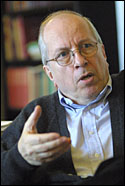Diving into hot water
Olli Miettinen claims that he does not want to be a scientific missionary. Fate, it seems, has different plans for the McGill-based epidemiologist and biostatistician, who has been drawn into a raging debate on the value of breast cancer screening.
 Epidemiology and biostatistics professor Olli Miettinen
Epidemiology and biostatistics professor Olli MiettinenPHOTO: Owen Egan |
|
It started in January 2000, when two Dutch researchers published an article in The Lancet, which claimed that mammographies were not useful for screening for breast cancer. Previous research had indicated that regular screening could lead to a 30 percent reduction in mortality.
For the last two years the scientific and medical community has been engaged in a spat that has sometimes degenerated nearly to namecalling. Miettinen, who is collaborating with scientists at Cornell University in the area of lung cancer screening, realized that with the National Institute of Health in the U.S. about to launch a major study in his field, the topic of mammographies was too close to home to not get involved.
"They are about to launch a trial costing some $300 million. Our concern is to see that it is done right, without leading to similar controversies that we are seeing now in the area of breast cancer screening," explains Miettinen.
Seeing that it is "done right" has landed the researcher in one of the most heated medical controversies of the day.
A paper he recently published in The Lancet to rebut the claims of the Dutch researchers has been criticized in The New York Times, lauded on ABC, and blasted as propaganda by Cornelia Baines, a Toronto physician who was one of the primary investigators in a major Canadian study on breast cancer screening.
Miettinen is not fazed in the least, believing that his work on this subject represents a new paradigm for this kind of study.
"I'm pleased to feel that I know what's right, even if the world ignores it," he says.
In Miettinen's research paper, the value of mammographic screening receives a fresh endorsement. Mammographies do lead to better health outcomes for breast cancer patients, he asserts.
The central premises that differentiate Miettinen's approach from all previous screening studies are simple. Previous studies had put together all screening subjects when calculating results. This meant that a subject who died 14 years after screening took place -- even if there were no subsequent screening -- was treated as a fatality like any other.
"The current culture treats screening as though it were an intervention, as though it were intended to have health effects," says Miettinen. "We regard screening as an early diagnosis, to be followed by early interventions, with the idea that early intervention is more effective.
"In this area, of assessing the usefulness of the modality of screening for cancer, there is a singular culture going back decades, and that culture... is quite profoundly misguided."
In his Lancet article, Miettinen and his cohorts at Cornell stress that the most relevant time period to look at when measuring the effectiveness of mammography screening starts roughly six years after screening began. To focus on results too early in follow-up or too late ignores the period when screening is most likely to show results.
His work has attracted fire. Baines, who headed one of the major studies criticized by Miettinen, recently wrote an opinion piece that hinted darkly that his group had a conflict of interest. As some of Miettinen's colleagues are radiologists, she claimed that they have an interest in promoting the use of mammographies.
"If you want to get to the topic of vested interests, surely it is not only radiologists who have vested interests. Once you have published something it is in your interest to stand by it rather than to learn from others," Miettinen shoots back, adding that as his colleagues are academics, not practicing doctors, they therefore do not stand to gain from increased mammography use.
Although Miettinen does concede that further study needs to be done, he believes that it must be done in a way that can properly quantify the value of screening -- something that he says has been sadly lacking in previous studies. Moreover, he cautions we must be careful to not throw the baby out with the bathwater.
"Absence of evidence is not evidence of absence," he says. "Absence of evidence of usefulness of screening for breast cancer is not evidence of lack of usefulness."

